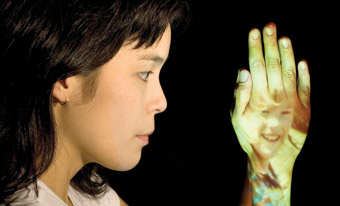 |
Adrienne Wong, My Name is Rachel Corrie photo Tim Matheson |
My Name is Rachel Corrie has two goals. One is to let us better know Rachel Corrie, who was killed in Rafah in 2003 when she stood in front of an Israeli bulldozer trying to demolish a Palestinian home. The other goal is to let us better know the situation in the Gaza Strip.
Rachel Corrie comes across as a profoundly serious woman who rarely indulges in the playful self-mocking of her Dairy Queen story. At first her words reflect the powerful influences of youthful self-absorption and activism. She speaks of “doing progressive work” on “anti-war slash global issues”, and informs us that she “tries to be local. That’s a big part of my ethic.” When later given the chance to leave Rafah and go to France, she writes that she would “feel a lot of class guilt.” The words are genuine Rachel Corrie – they come from Corrie’s own emails and journals – but they were meant to be read, not to spoken, and it’s hard to hang a play on their formal sincerity. There’s no doubt this is how an intelligent, passionate, political young woman would write, the kind of woman whose boyfriend reads anarchist works, the kind of woman who finds out that a salmon creek has been funneled into an underground pipe in downtown Olympia. “It’s hard to be extraordinarily vacuous when you always have salmon in the back of your mind.” But it’s not how this same young woman would speak to us directly, and there might have been more imaginative ways to adapt the original material.
An additional difficulty is that, in Wong’s delivery, Rachel’s emotional highlights are almost always based on political outrage. The director has also set the pace of the play very fast, and it feels relentless. The set compounds the sense of small range. Rachel only moves in the cramped white square on the floor, set with a chair and a table on wheels. She never steps outside the square, except when the lighting design adds a narrow grey pathway around it, and she treads that carefully. Rachel lives in a world she sees very clearly. Her sense of right and wrong is almost religious. Her certainty fuels her activism – it takes her to Gaza to see how she can help. People who tread the grey pathways more often would never buy the ticket.
At first she benefits from the trip. In Palestine, her language changes abruptly. It’s less inflected with stock liberal phrases, less about herself and more about the world around her. She becomes more real to us. And yet she still prefers to say, “I am scared for these people.” It takes a very long time before we hear her admit, “I am scared.” In fact one of the most poignant moments comes from her father instead. He writes her to say he is proud of her, but “I would rather be as proud of someone else’s daughter.” They are simple words and simple emotions, and they carry.
Rachel ploughs and re-ploughs the same white square, perhaps now the safe space of her own privilege as an American citizen, as she tells us what she experiences in Rafah. Long narrow screens on all four walls show us horizontal images of rubble, and walls pocked with bullets. It’s the first time we see representational images on the screens, as if coming to Palestine has been our first glimpse of the real world. But she never refers to any Palestinians by name, and even her fellow volunteers she calls “the Internationals.” Rachel is so focused on the power structure that everyone is identified by their position in it, rather than by their own identity. Although we see, and honour, her commitment, although we learn more about the daily struggles for normal life in Rafah, and although we share her sense of wrong, the window she opens for us in the Middle East always feels like a narrow one, just like the projections on the wall. The narrowness isn’t due to a single point of view. That’s all any of us would have to offer.
It’s important that we get to see plays like My Name is Rachel Corrie, even if limitations in the scripting and direction detract from the potential power of the story. But few among us will go abroad to witness first hand the results of our country’s foreign policy, as Rachel chose to do. The play asks us: what might happen if we did?
neworldtheatre & Teesri Duniya Theatre, My Name is Rachel Corrie, taken from the writings of Rachel Corrie edited by Alan Rickman and Katherine Viner, director Sarah Garton Stanley, performer Adrienne Wong, collaborating director Marcus Youssef, designer Ana Cappelluto, lighting Itai Erdal, sound Peter Cerone, video Candelario Andrade, sound/video systems Jesse Ash; Havana Theatre, Jan 24-Feb 2; PuSh International Festival of Performing Arts, Jan 16 - Feb 3
Anna Russell is a Vancouver writer and filmmaker who is also an analyst with the Canadian Federal Government.
© Anna Russell; for permission to reproduce apply to [email protected]








 back
back